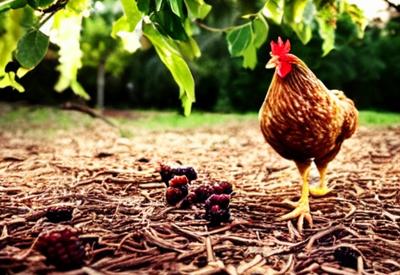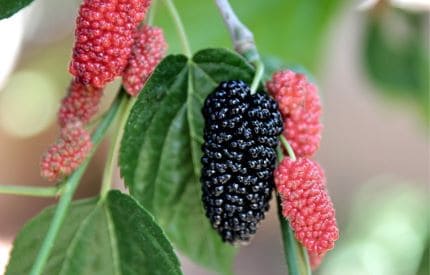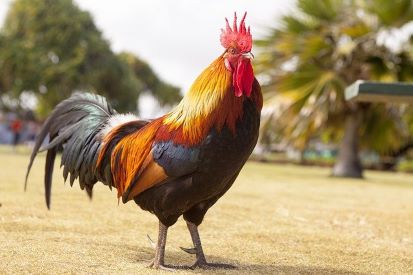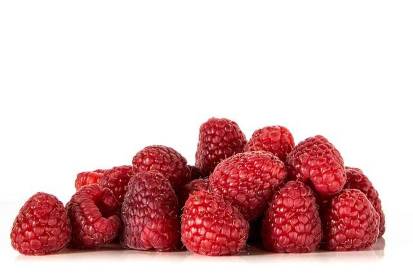One fruit that may come up when discussing chicken diets is mulberries, but can chickens eat mulberries safely?
Mulberries are safe for chickens to eat in moderation. They contain fiber and potassium, as well as vitamins A and C. The most popular way to feed mulberries to chickens is by adding them to their regular feed in small amounts since too much can cause diarrhea or other digestive issues.
Though chickens can eat mulberries, they should not make up a large portion of their diet. It’s recommended that chickens mainly be fed grains and other foods specifically designed for poultry. This article will explain why and also provide more information on feeding chickens mulberries.

Can chickens eat mulberries?
If you are a chicken owner, you know that chickens need a healthy, balanced diet full of protein, carbohydrates, and fats.
While many vegetables and fruits can be added to their regular feed in moderation as treats, it is crucial to ensure they are getting the right vitamins and minerals.
Mulberries are safe for chickens to eat in moderation, but they shouldn’t make up a large portion of their diet. Mulberries contain fiber and potassium, as well as vitamins A and C.
In addition to the vitamins and minerals found in mulberries, they also provide a tasty treat for your flock. Chickens love the juicy sweetness of these berries.
They also contain antioxidants that help protect against disease and infection while boosting your chicken’s immune system.
[ChickenAffiliate]
The benefits of eating mulberries for chickens
Mulberries are an excellent source of nutrition that can provide a range of benefits to chickens if included in their diet. Let’s explore why mulberries benefit chickens and examine five key points about how they can improve your flock’s health.
Mulberries Contain a Range of Nutrients
Mulberries contain several beneficial nutrients to chickens, such as calcium, phosphorus, magnesium, zinc, iron, vitamins A and C, and dietary fiber. These nutrients help keep chickens healthy and strong while boosting their immune system.
Furthermore, mulberries contain high levels of antioxidants that help protect chickens from disease-causing free radicals and other environmental stressors.
Mulberries Can Improve Egg Quality
The nutrient-dense nature of mulberries helps improve the quality of eggs produced by hens fed a diet supplemented with these berries.
In addition to providing vital minerals and vitamins to hens that lay eggs, mulberry consumption has been linked with improved eggshell integrity, increased egg production rate, and higher volumes of egg whites produced per day.
Feeding your birds mulberries regularly will ensure they get all the essential vitamins and minerals needed for producing healthy eggs consistently.
Mulberries Help Enhance Feather Growth
High-quality feathers are essential for keeping chickens warm in winter or helping them cool down during summer days. The presence of vitamin A found in mulberries can help boost feather production in birds by improving blood circulation throughout the body.
Vitamin A is also associated with better vision in birds which can help them spot potential predators or sources of food quicker than normal. Furthermore, the antioxidant content found in mulberries will help reduce oxidative damage caused by free radicals, which can lead to fragile feathers over time.
Mulberries Are Easy To Digest
The soft texture and sweet taste make it easy for your birds to digest mulberry fruits quickly without any issues. This makes it ideal for use as part of balanced diets or as occasional treats if you want to give your flock something special once in a while.
Additionally, feeding your birds small quantities regularly instead of large amounts at once allows them to reap maximum nutritional benefits from this fruit without having any adverse side effects later on.
Mulberries Are Highly Palatable
Chickens love mulberries’ sweet, juicy taste, making them an ideal addition to chicken diets. The texture makes them easy to eat, as chickens cannot chew hard foods efficiently.
Mulberries can be given to your flock fresh, dried, or frozen, depending on what’s available and the time of year. If you have a mulberry bush in your garden, you can allow your chickens to forage them naturally.
Things to watch out for when feeding mulberries to chickens

You should keep a few things in mind when feeding mulberries to your chickens. Let’s break down some points that chicken owners should be aware of before they feed their birds mulberries.
Mulberry Leaves Can Be Toxic
While the berries themselves are safe to eat, the leaves of the mulberry tree can be toxic to chickens. The leaves contain a chemical called glycoside which is poisonous for birds if ingested in large quantities.
Chicken owners need to ensure that all parts of the berry (except for the actual fruit) are removed from the area where their chickens can access them.
Rotting Berries Are Unsafe
When feeding mulberries to your chickens, it is essential that they are fresh and not rotten or moldy in any way. Rotten berries can carry salmonella bacteria, making your birds very ill if ingested in large quantities.
Make sure to check all the berries before giving them to your chickens – discarding any that look suspicious – and remove any rotten ones immediately, so they don’t contaminate the rest of the berries.
Limit Consumption
Although mulberries are an excellent source of nutrition for your chickens, you should feed them sparingly as they can cause digestive issues due to their high sugar content. As with any new food item you introduce into your chickens’ diet, moderation is key.
Start by giving small amounts until you know how much your flock can handle without adversely affecting their digestive system or overall health.
How often should chickens eat mulberries?
Mulberries can be an excellent and delicious treat for chickens, but they should not form part of their regular diet. As a rule, chickens should only eat mulberries in moderation, no more than 10% of their diet.
This is because while the fruit may provide some health benefits, due to the high sugar content, it is best kept as an occasional treat. It’s generally recommended that chickens have mulberries at most once or twice a week.
Whether you are feeding them fresh or dried versions, always keep an eye on how much your chickens consume and monitor their health afterward to ensure they don’t experience any adverse reactions.
How to prepare mulberries for feeding to chickens

If you have mulberry trees in your backyard, or if you know of a local source for the fruit, here’s how to prepare them for feeding to your chickens.
Wash First
Before giving mulberries to your chickens, it’s important to wash them first. This is especially true if you’re getting them from a local source, such as a farmer’s market or farm stand. You want to remove any dirt or debris before feeding it to your birds.
To clean the berries, rinse them in cold water and then pat them dry with paper towels.
Give Them A Handful At A Time
Once the mulberries are washed, it’s time to feed them to the chickens. It’s best not to give too many at once. Instead, give the birds a handful of mulberries at a time.
This is because the birds may not be able to eat all of the berries in one sitting, and they should get a variety of foods throughout the day.
No Need To Chop Them
Mulberries don’t need to be chopped before feeding them to your chickens; they can eat them whole. The small size of the berries makes it easy for even smaller breeds of chickens to consume without difficulty.
However, if you chop the berries into smaller pieces before giving them out, that also works. Just be sure not to chop them too finely, so the birds don’t choke on the pieces.
Can baby chickens eat mulberries?
Baby chickens can indeed be offered mulberries – make sure to introduce them cautiously, as too many can cause an upset stomach. You should wait until the baby chicks are a few weeks old before giving them any treats like mulberries, as their digestive system is still developing, and too many of these high-sugar treats could cause problems.
It’s best to offer them only in moderation, no more than once a week, and always adjust the portion size depending on their appetite.
What other berries can chickens eat?

Mulberries are a popular choice for feeding chickens, but did you know there are other berries that your feathered friends can enjoy too? Each type of berry has its own health benefits, so let’s take a closer look at some alternatives to mulberries.
Strawberries
Strawberries are packed with antioxidants and Vitamin C. They also have anti-inflammatory properties, which help to keep your chickens healthy from the inside out. Eating strawberries can help boost the immune system and provide a dose of natural sweetness.
It’s important to note that strawberries should be given in moderation, as they contain sugar and can cause digestive problems if given in excess.
Read More: Can Chickens Eat Strawberries? 6 Excellent Benefits
Blueberries
Blueberries are high in dietary fiber, which helps to keep chickens’ digestive systems running smoothly. They’re also packed with antioxidants and vitamins, making them an excellent choice for helping to keep chickens healthy over time.
Blueberries are especially beneficial for older birds since they help boost energy levels and keep feathers glossy and vibrant.
Read More: Can Chickens Eat Blueberries? 5 Important Benefits
Blackberries
Blackberries are rich in Vitamin C, magnesium, and potassium, making them a great source of nutrition for chickens. They also contain fiber, which helps to regulate digestion and prevent constipation in hens.
In addition, blackberries contain tannins that help protect against certain kinds of bacteria and parasites that can affect chickens’ health.
Read More: Can Chickens Eat Blackberries? 5 Fantastic Benefits
Cranberries
Cranberries are full of antioxidants and Vitamin C, which help to strengthen the immune system and ward off disease-causing pathogens from entering the body through the digestive tract or respiratory system.
Cranberries can also help reduce inflammation caused by bacterial infections or injury due to their high levels of quercetin and anthocyanins – two important compounds found in cranberry juice that have strong anti-inflammatory properties.
Read More: Can Chickens Eat Cranberries? 6 Amazing Benefits
Raspberries
Lastly, raspberries offer a range of essential nutrients, including Vitamin B6, folate (Vitamin B9), iron, magnesium, and manganese – all essential elements that contribute to overall chicken health.
Raspberries are also rich in dietary fiber, which helps support healthy digestion while providing energy throughout the day.
Read More: Can Chickens Eat Raspberries? 5 Awesome Benefits
How to give chickens a healthy and balanced diet
Healthy chickens are happy chickens, and the best way to ensure that your feathered friends stay healthy is to provide them with a balanced diet. A good diet for a chicken should include plenty of proteins, grains, fruits, vegetables, and greens.
In addition to ensuring that your chickens get all the necessary nutrients, a balanced diet will also help keep them from becoming bored with their food. So how exactly do you go about giving your chickens a balanced diet? Let’s take a look.
Types of Feeds
You can give your chickens two main types of feed: commercial feed and scratch feed. Commercial feed is usually made up of grains like wheat, oats, barley, and corn milled and combined with other essential components like vitamins and minerals to create an all-in-one food source for chickens.
Scratch feed comprises whole grains like wheat, oats, sunflower, and millet seeds. Both types of feeds have their pros and cons. Commercial feed is easy to store and helps ensure your chickens get the proper nutrients from their food. Scratch feed provides more variety for your birds but may require additional supplementation to get all the necessary vitamins and minerals.
Fruits & Vegetables
In addition to providing your chickens with commercial or scratch feed, it’s also important to supplement their diets with fresh fruits and vegetables occasionally and some greens like fresh grasses or weeds.
Fruits such as apples, oranges, or melon are excellent sources of vitamin C, while vegetables such as carrots or squash can provide additional vitamins and minerals.
Greens such as grasses or weeds can be given in small amounts daily; ensure they haven’t been sprayed with chemical pesticides beforehand.
Protein Sources
Protein is essential for healthy chicken growth, so you must regularly include protein sources in their diet. Insects such as mealworms, crickets, or waxworms make great sources of protein, but if these aren’t available, then cooked eggs (no shells), cooked chicken livers, or cooked beef can work well too.
Be sure to feed these proteins appropriately; too much can lead to health problems.
Can chickens eat mulberries – final thoughts
Mulberries are a great source of nutrition for your chickens if fed in moderation. They provide essential vitamins and minerals while offering an exciting treat that will keep your flock entertained.
However, it is important not to overfeed your chickens with any food, including mulberries; too much of anything can upset their digestive system leading to health problems.
Mulberries are an excellent choice when considering what treats you should add to your flock’s diet.
Related Articles:
